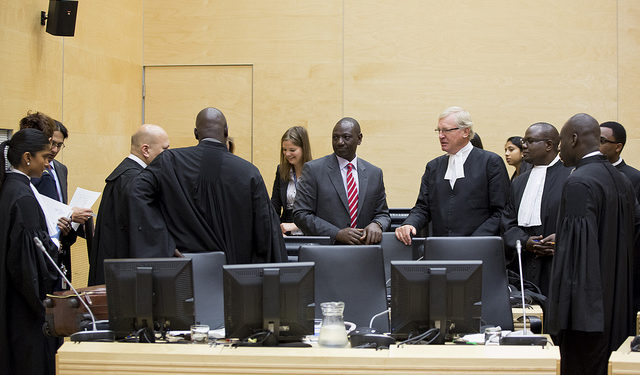William Ruto and Journalist Joshua Sang’s defence teams have filed a motion of no case to answer at the International Criminal Court (ICC) citing lack of sufficient evidence from the Prosecution’s witnesses.
In the application filed by Ruto’s lead counsel Karim Khan, the defence outlined five reasons why Ruto should be acquitted of the charges against him.
Ruto is accused of being criminally responsible as an indirect co-perpetrator pursuant to article 25(3)(a) of the Rome Statute for the crimes against humanity of: murder (article 7(l)(a)); deportation or forcible transfer of population (article 7(l)(d)); and persecution (article 7(l)(h)) committed in the context of the 2007-2008 electoral violence in Kenya.
Fatou Bensouda, the ICC Chief Prosecutor, noted in her opening statement in the William Ruto and Joshua Sang trial that, “The case which we are about to commence concerns the individual criminal responsibility of the two accused, William Samoei Ruto and Joshua Arap Sang, for the roles they played in the terrible crimes committed against the Kenyan people during the 2007 Post-Election violence: Mr. Ruto, as a powerful politician, for his role in planning and organizing violence to achieve his political ambitions and satisfy his thirst for political power. Mr. Sang, as a radio broadcaster, for his role in using his public voice to further Mr. Ruto’s criminal plans.”
On the other hand, Khan requests the Trial Chamber,” To enter a judgment of acquittal in respect of the three counts of crimes against humanity with which Mr. Ruto is charged.”
Khan says the case has been built on hearsay.
“The Chamber is presented with a situation not specifically addressed in its Decision, nor at any other international criminal tribunal – namely did a case build almost entirely on hearsay, whether it be in respect of the core testimony of the viva voce witnesses or the R68 evidence. OTP’s reliance on hearsay evidence demonstrates a case that has ‘completely broken down’.”
Thus, “A judgment of acquittal is in the interests of justice whether it be from the perspective of Mr. Ruto or from that of the victims, who should not be led to believe that a conviction could result in this case, or from the standpoint of judicial efficiency and economy,” Khan states.
This was confirmed based upon the statements of the “Confirmation Six”. “Only three of these confirmation witnesses appeared before this Chamber, namely:
P-0658, who failed to testify in line with his original statement, stating, in respect of one meeting relied upon at confirmation,10 that “it [was] not a story that [he]…want[ed] to stand by”;
P-0743, who was declared “a thoroughly unreliable and incredible witness” by the OTP while on the stand; and (iii) [REDACTED].The fourth witness, P-0025, was withdrawn by the OTP as “not reliable”.
The fifth witness, P-0015, whose [REDACTED] was the subject of the summons decision but the OTP decided not to call him.
Finally, P-0024, who [REDACTED], withdrew cooperation from the OTP for reasons unknown but was not made the subject of a summons request. The evidence relied upon by the PTC to confirm this case has, on any analysis, evaporated.
“The case hinges on a very limited number of uncorroborated allegations contained in written statements signed by blatantly unreliable witnesses who recanted these allegations under oath. Most importantly, none of the allegations brought by recanting or non-recanting witnesses against Mr Sang reveal criminal conduct,” according to Joseph Kipchumba Kigen-Katwa.
However, the prosecutor has asked judges to dismiss both motions. The Prosecution says, “Evidence presented, taken at its highest, is sufficient to satisfy a reasonable Trial Chamber that the Prosecution has proved all of the essential elements required to secure a conviction of both Accused.”







